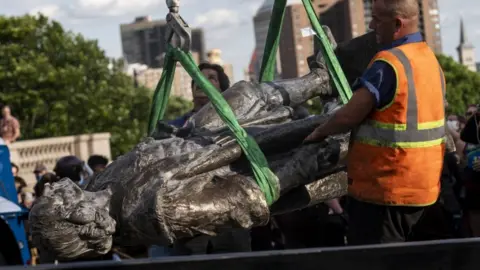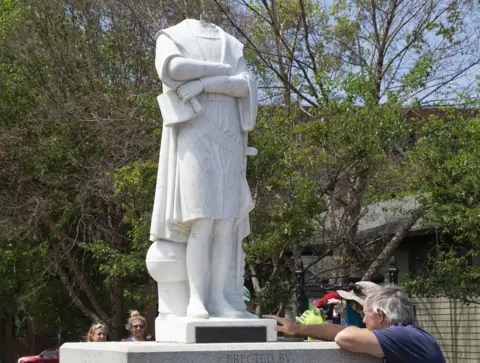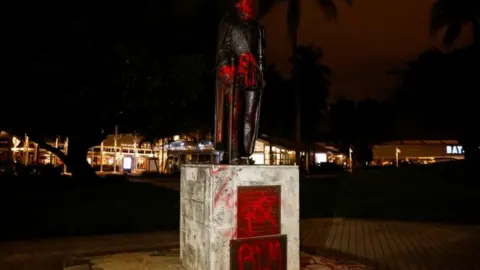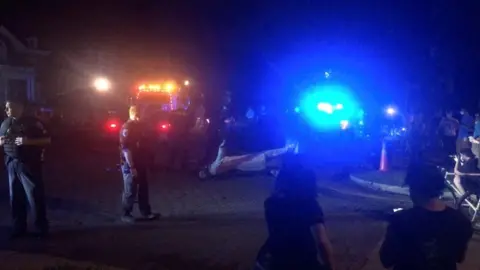Confederate and Columbus statues toppled by US protesters
 Getty Images
Getty ImagesStatues of Confederate leaders and the explorer Christopher Columbus have been torn down in the US, as pressure grows on authorities to remove monuments connected to slavery and colonialism.
A statue of Confederate President Jefferson Davis was toppled in Richmond, Virginia, on Wednesday night.
Statues of Columbus in Boston, Miami and Virginia have been vandalised.
The movement has been sparked by the death in police custody of African American George Floyd.
His death in Minneapolis has led to protests in the US and internationally against police brutality and racial inequality.
Memorials to the Confederacy, a group of southern states that fought to keep black people as slaves in the American Civil War of 1861-65, have been among those targeted.
A number of Confederate statues on Monument Avenue in Richmond have been marked with graffiti during the protests.
Richmond also saw a statue of Italian explorer Columbus pulled down, set alight and thrown into a lake earlier this week,.
A three-metre tall (10ft) bronze statue of Columbus was toppled in Saint Paul, Minnesota, on Wednesday.
The Columbus statue in Boston, which stands on a plinth at the heart of town, was beheaded.
 EPA
EPAMany people in the US celebrate the memory of Columbus, who in school textbooks is credited with discovering "the New World", the Americas, in the 15th Century.
But Native American activists have long objected to honouring Columbus, saying that his expeditions to the Americas led to the colonisation and genocide of their ancestors.
 Reuters
ReutersThe death of Mr Floyd, whose neck was kneeled on by a police officer for nearly nine minutes, has spurred global protests led by the Black Lives Matter movement.
Many cities and organisations have taken steps to remove Confederate symbols, which have long stirred controversy because of their association with racism.
 Reuters
ReutersLast week, for example, Virginia's Governor Ralph Northam announced that a statue of Confederate General Robert E Lee would be removed from Richmond.
However, a judge has since granted a temporary injunction stopping the removal.
Stock-car racing organisers Nascar announced on Wednesday it was banning Confederate flags, frequently seen at races.
US President Donald Trump has meanwhile rejected calls to rename military bases named after Confederate generals, saying they remain part of America's heritage.
He tweeted: "The United States of America trained and deployed our HEROES on these Hallowed Grounds, and won two World Wars. Therefore, my Administration will not even consider the renaming of these Magnificent and Fabled Military Installations."
Allow X content?

On Wednesday, Mr Trump renewed threats to take federal action against local protesters occupying public spaces.
In a pointed exchange on Twitter, Mr Trump demanded that the mayor of Seattle "take back your city" from protesters, whom he called anarchists and domestic terrorists.
In a tweet of her own, Mayor Jenny Durkan responded that Mr Trump could make everyone safe by going back to his White House bunker.
Allow X content?

A similar backlash against statues of slave owners has been seen in the UK since Mr Floyd's death.
Black Lives Matter demonstrators tore down a statue of slave trader Edward Colston and threw it into a harbour during a protest in the city of Bristol on Sunday.
On Thursday, Bristol City Council said it had retrieved the statue, which will be taken to a secure location before becoming a museum exhibit.
Earlier this week, a statue of noted slaveholder Robert Milligan was removed from outside the Museum of London Docklands.
And, during a Black Lives Matter protest in London last weekend, a statue of Sir Winston Churchill in Parliament Square was sprayed with graffiti.

More on George Floyd's death
- VIEWPOINT: Tipping point for racially divided nation
- WATCH: 'This is why we are protesting'
- TIMELINE: Recent black deaths at hands of police
- BACKGROUND: Five pieces of context to understand the protests
- CRIME AND JUSTICE: How are African Americans treated?
